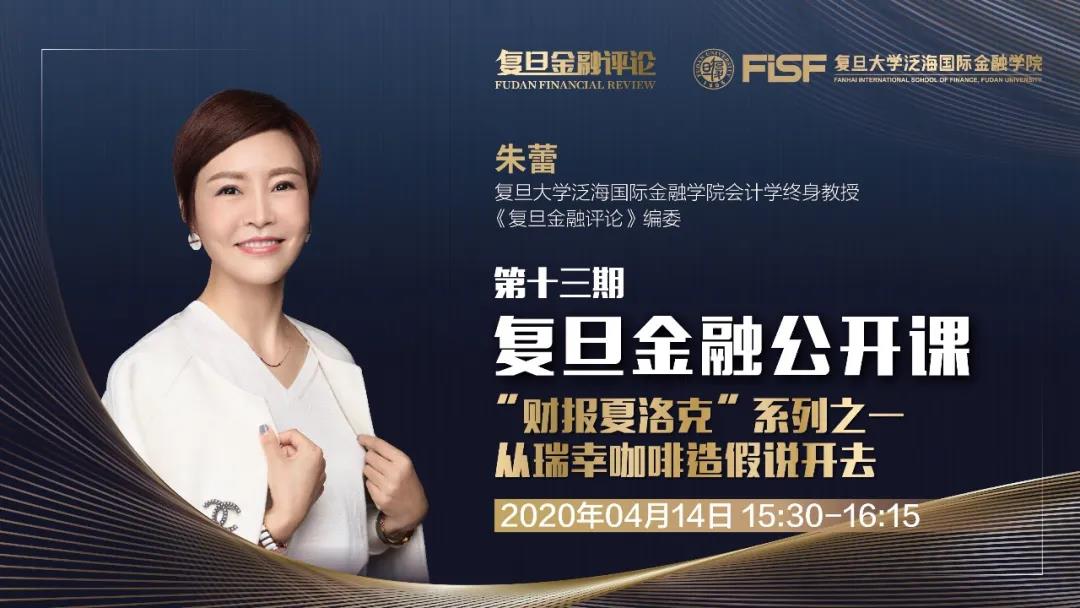
-
 86-21-63895588
86-21-63895588
-
 No.1, Lane 600, Nanchezhan Road, Huangpu District, Shanghai 200011
No.1, Lane 600, Nanchezhan Road, Huangpu District, Shanghai 200011
Release time:2020-04-15

On February 1 this year, Muddy Waters Research, a well-known due diligence investment firm and a short-seller, received an unattributed 89-page report accusing Luckin Coffee of financial fraud. The allegations were continuously denied by the coffee chain, until the evening of April 2, when the company issued an announcement admitting that transactions have been falsified. Luckin confessed that numbers have been inflated in the period between the second and the fourth quarter of 2019, involving sales of RMB 2.2 billion. After the press release, LK’s stock price plunged nearly 85%.
Professor Zhu Lei analyzed the Muddy Waters’ report and pointed out that it was divided into two main parts: the first part makes clear that Luckin has been exaggerating its customer unit prices, store sales volume, revenues and advertising expenditures; the second part draws attention to the management’s lack of credibility and problematic business models. The document’s evidence is backed by more than 11,200 hours of videotaping, 92 full-time and 1,418 part-time staff recruited to run surveillance and record traffic in the coffee stores. Although the report’s conclusions are eloquent, the large-scale costs of such an investigation are unbearable for most financial agents.
As an ordinary investor, how to identify such lurking risks? Prof. Zhu Lei clarified that first we need to analyze how strong is the company’s financial fraud motivation. Generally speaking, companies with unclear profit models, high financial requirements, low proportion of shares held by the management, and bad criminal record are the most probable future fraudsters. Usually, companies are driven by three types of common counterfeit motives: for the purpose of “beatifying” performance, for financing needs or for regulatory requirements. These three reasons form an inseparable core, which is the management interest.
Let’s take Luckin Coffee as an example! At first glance, its profit model is clear and the company’s prospectus is teeming with countless catchy phrases, such as: “big market”, “brand bargaining power”, “technology driven”, “new retail”, etc. However, it is too good to be true− after a careful analysis, the fantastic prospects prove to be nothing but an illusion. To add more fuel to the fire, the “burn money” strategy is hardly reversible in the short-run, which kindles the vicious cycle of unceasing financial needs. One more concern is the obvious principal-agent problem: according to its F-1 Form from January 2020, its management has pledged a large number of shares. Finally, Luckin’s senior management team and investors are all connected to the so-called “Shenzhou enterprises” (it seems that Luckin Coffee is a project incubated within the Shenzhou enterprises system, which major representatives are UCAR Inc. and CAR (China Auto Rental)). We should not overlook the fact that the above-mentioned have a bad history of management cash-outs, causing stock price decline.
The next step after evaluating a company’s fraud motivation is financial diagnosis. Prof. Zhu Lei emphasized two common methods of identifying income statement fraud: the first is horizontal analysis, that is, comparison of account balances and ratios over different time periods, which is used to indicate changes in financial performance between comparable periods; and the second is vertical analysis, i.e. comparison of financial items as a percentage of their base figure.
As a useful illustration, Prof. Zhu made a horizontal comparison between Luckin and Starbucks. She noted that both had relatively stable store revenues from Q2 2018 to Q1 2019, but from Q2 2019 Luckin’s single store revenues grew very rapidly, which should have rung an alarming bell. Moreover, examining the company’s earnings exposed that its Q2-Q3 data in 2019 did not match the demand curves at the individual-level and store-level. Thus, it could be inferred that the coffee chain has been overstating its sales prices and/or sales volumes.
Last but not least, Prof. Zhu Lei stated that although Luckin’s fraud case triggered a short-lived “earthquake” in the U.S. stock market− the tremor caused by the relatively perfect mechanism of the American market− good companies would eventually regain market recognition. In addition to government supervision and policy improvement, the further development of the Chinese financial markets requires higher investor participation, including value investors and short-selling institutions, to jointly explore the true value of companies and to eliminate market information asymmetry through information disclosure. At present, China’s financial markets are constantly improving their own “firewall”. For instance, China launched the registration-based IPO system and has been gradually introducing the short-selling mechanism, so that the capital market can play a supervisory role and better protect investors.